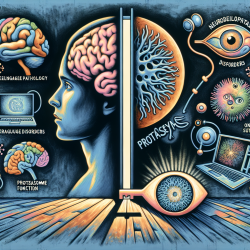Introduction
The intersection of genetic research and therapeutic practice is a fertile ground for innovation, particularly in the field of speech-language pathology. Recent findings from the study "PSMC5 insufficiency and P320R mutation impair proteasome function" (Yu et al., 2024) have shed light on the genetic underpinnings of neurodevelopmental disorders. These insights hold significant potential for practitioners in speech-language pathology, especially those involved in online therapy services like TinyEYE. By understanding the role of proteasome dysfunction in neurodevelopmental disorders, practitioners can refine their approaches and potentially improve outcomes for children with speech and language delays.
The Role of Proteasomes in Neurodevelopment
Proteasomes are crucial for the degradation of proteins within cells, a process essential for maintaining cellular health and function. The study highlights how mutations in the PSMC5 gene, particularly the P320R mutation, disrupt proteasome function. This disruption is linked to neurodevelopmental disorders characterized by developmental delays, including speech and motor delays. The research underscores the importance of proteasomes in neuronal function and development, providing a biological basis for the observed clinical features in affected individuals.
Implications for Speech-Language Pathology
For speech-language pathologists, these findings offer a new perspective on the etiology of certain speech and language disorders. Understanding that proteasome dysfunction can lead to neurodevelopmental issues allows practitioners to consider genetic factors when assessing and planning interventions. This knowledge can be particularly useful in tailoring therapy to the specific needs of children with known genetic mutations, potentially leading to more effective and personalized treatment plans.
Encouraging Further Research and Application
The study opens avenues for further research into the genetic causes of speech and language disorders. Practitioners are encouraged to stay informed about genetic research and consider collaborating with geneticists to explore the potential genetic components of the disorders they encounter. Additionally, integrating genetic insights into therapy could involve developing new strategies that address the underlying biological causes, rather than just the symptoms.
Practical Steps for Practitioners
- Stay Informed: Regularly review the latest research in genetics and neurodevelopmental disorders to keep therapy practices up-to-date.
- Collaborate with Experts: Work with geneticists and other healthcare professionals to understand the genetic aspects of speech and language disorders.
- Personalize Therapy: Use genetic insights to tailor therapy plans to the individual needs of children, potentially improving outcomes.
- Educate Families: Help families understand the potential genetic factors involved in their child's condition, empowering them with knowledge and options.
To read the original research paper, please follow this link: PSMC5 insufficiency and P320R mutation impair proteasome function.










